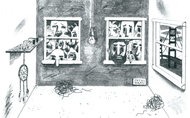NY Times Article By SCOTT JAMES
Published: June 6, 2013
SAN FRANCISCO — VISITORS have forever left their hearts in San Francisco. But leaving the rest of your body here isn’t so easy: there’s no place to live.
The City by the Bay is going through one of its worst housing shortages in memory. With typical high demand intensified by a regional boom in tech jobs, apartment open houses are mob scenes of desperate applicants clutching their credit reports. The citywide median rental price for a one-bedroom is $2,764 a month, but jumps to $3,500 in trendy areas.
One reason for the shortage? Me.
I’ve recently joined the ranks of San Francisco landlords who have decided that it’s better to keep an apartment empty than to lease it to tenants. Together, we have left vacant about 10,600 rental units. That’s about five percent of the city’s total — or enough space to house up to 30,000 people in a city that barely tops 800,000.
I feel a twinge of guilt for those who want to settle in this glorious city but can’t find a flat. But after renting out a one-bedroom apartment in my home for several years, I will never do it again. San Francisco’s anti-landlord housing laws and political climate make it untenable.
My partner and I bought our home in the city’s Castro neighborhood in 2004. We live upstairs and there’s a smaller rental downstairs. At first we had wonderful tenants, and the income helped make our mortgage payments more affordable.
Then we rented to a man who began as a good neighbor, but who soon became a nuisance — and who eventually became destructive and dangerous. It started one night when the tenant forgot his keys and rang our doorbell at 2 a.m. until we let him in. Then it happened again and again and again.
One afternoon when he locked himself out, we weren’t home. But rather than contact a locksmith, he borrowed a ladder and a sledgehammer from a construction site next door, hopped the backyard fence and tried to smash his way into our building.
After he was discovered, midswing, he said that under San Francisco’s tenants’ rights laws, he was allowed to destroy our property, as long as he fixed it later.
That might sound crazy, but it is a widely held belief among renters here that laws are so tilted in favor of tenants (and against landlords) that renters can get away with any outrageous behavior. Indeed, in a city where 64 percent of residents are renters — and politicians court these voters — the rhetoric from some in City Hall and from tenants’ rights advocates is often vitriolic toward landlords.
Tensions over housing here are nothing new. From the city’s Gold Rush beginnings — and the many subsequent booms — demand has often exceeded supply. And constructing new residences is difficult because we’re nearly surrounded by water and few locals wish to alter the city’s low-rise charm by building skyward.
To stabilize rents and prevent eviction abuses that are typical when housing is scarce, the city developed some of the nation’s toughest housing policies. Rent-control ordinances, for example, sharply limit rent increases after the initial lease for most housing constructed before 1979. As a result, many leases morph into lower-rent tenancies for life, subsidized by landlords, even when the tenants are wealthy.
In addition, a complex legal structure has been created to make evictions for just cause extraordinarily difficult.
At first many of these rules governed only apartment complexes and larger properties with many units. But in 1994 the city applied the regulations to homes if they included just one rental on the property. In other cities, including New York City, such small-time landlords have far more rights over their own homes.
It’s no wonder that our tenant apparently believed he could act with impunity.
One day, after the sledgehammer incident, the tenant flooded his apartment and submerged a plugged-in appliance into an overflowing sink, shorting out the electrical system. We were lucky a fire didn’t start and burn down the block.
After countless sleepless nights, and worried for our safety, we hired a lawyer who specialized in tenant law. With more than a dozen serious incidents documented, we began eviction proceedings. Three days later, the tenant left on his own. (Destroying property, it turns out, is not actually a tenant’s right — even here.)
A few days later, I happened to receive a call from the city about our property-tax appraisal. Among the questions: was anyone renting our downstairs?
Not right now, I said.
Well, the clerk explained, because of the city’s troublesome rental laws, a tenant-free property is much more valuable.
A check of comparable recent sales in our neighborhood, in fact, shows that empty buildings are worth hundreds of thousands of dollars more than those with tenants, and with the current housing-price boom, that profit margin (on paper, anyway) increases each month.
That’s why we’ve joined the ranks of thousands of other small-time landlords here who will never rent again, adding to the city’s housing shortage.
That doesn’t mean the apartment sits empty. This is “Everybody’s Favorite City,” so we’ve had no shortage of visiting family and friends.
No, it doesn’t pay the mortgage. But then, not once have we worried that any of our houseguests would reach for a sledgehammer.
Scott James, a television journalist, is the author of the novel “SoMa,” written under the pen name Kemble Scott.
If you need help with temperature, contact Cold Craft, Inc.
408.374.7292 or [email protected]
Share This Article!
Newsletter
Subscribe to our newsletter and stay updated on the latest.
Your email is safe with us, we don’t spam.


